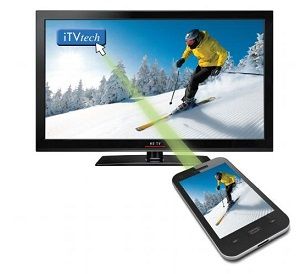iTVTech Aims for High-Precision, Motion-Based Remote Controls

A Philadelphia-area startup is developing technology that, it claims, will bring a higher level of precision and accuracy to the kind of wireless, gesture-based remote control experiences being offered today by Hillcrest Technologies and the Kinect system for the Xbox 360.
iTVtech, a company founded last fall and based in Radnor, Pa., is joining a growing field of vendors that are looking to improve the way consumers navigate TV interfaces. It believes the approach it’s cooking up will deliver a higher level degree of accuracy as video user interfaces become increasingly gesture based. The “Remote TelePointer” system for GPS-enabled smartphones and other handheld devices it’s developing will try to calculate an unprecedented level of precision by tapping into local Wi-Fi signals and nearby cellular signals and communicating that data to servers in set-top boxes.
This combination will establish on-screen accuracy down to a “centimeter level,” according to company co-founder and co-principal Mary Kate Dagit, who spent the last 12 years as an executive headhunter in telecommunications and IT. The company’s other founder and principal is her husband, Chet Dagit, a cable industry vet who is currently an exec at EPAM Empathy Lab, and is late of SeaChange International, Nielsen, and Comcast.
iTVtech also believes its use of wireless signals and GPS-enabled devices will likewise maintain this precision and a “virtual line-of-site” even when the user is situated ten to 15 yards away from the TV screen.
But the startup’s success is far from assured, as iTVtech is still developing a product that can take advantage of this idea. iTVtech has raised an undisclosed amount of seed funding to create a prototype that is six to twelve months away from completion, Dagit said.
What iTVTech has in mind is embodied in a patent application that describes a “Method and system for user interface for interactive devices using a mobile device.” As described, iTVTech’s proposed virtual-pointer technology would determine “geocode positioning information for a handheld device, and [use] that data to create a virtual pointer for a television display or interactive device.”
More about iTVTech’s strategy and the competitive forces it will face will be featured in the July 8 issue of Multichannel News.
Multichannel Newsletter
The smarter way to stay on top of the multichannel video marketplace. Sign up below.
